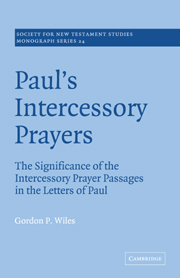 Paul's Intercessory Prayers
Paul's Intercessory Prayers Book contents
- Frontmatter
- Contents
- Preface
- Texts and Abbreviations
- 1 Introductory
- 2 Intercessory prayer material in Paul's letters
- 3 Intercessory wish-prayers: their background and form
- 4 Function of the wish-prayers in I Thessalonians
- 5 Function of the wish-prayers in Romans, I Corinthians, and Philippians
- 6 Blessings and curses
- 7 Intercessory prayer-reports: their form and function
- 8 Function of the prayer-reports in the thanksgiving periods
- 9 Function of the prayer-reports in the body of the letters
- 10 Requests and exhortations about intercessory prayer
- 11 Concluding statement
- Appendixes
- Bibliography
- Index of passages cited
- Index of authors
- Index of subjects
8 - Function of the prayer-reports in the thanksgiving periods
Published online by Cambridge University Press: 30 October 2009
- Frontmatter
- Contents
- Preface
- Texts and Abbreviations
- 1 Introductory
- 2 Intercessory prayer material in Paul's letters
- 3 Intercessory wish-prayers: their background and form
- 4 Function of the wish-prayers in I Thessalonians
- 5 Function of the wish-prayers in Romans, I Corinthians, and Philippians
- 6 Blessings and curses
- 7 Intercessory prayer-reports: their form and function
- 8 Function of the prayer-reports in the thanksgiving periods
- 9 Function of the prayer-reports in the body of the letters
- 10 Requests and exhortations about intercessory prayer
- 11 Concluding statement
- Appendixes
- Bibliography
- Index of passages cited
- Index of authors
- Index of subjects
Summary
The questions that were asked earlier about the wish-prayers must now be addressed to the individual prayer-reports: What new depth of meaning does the apostle add, in adapting a conventional epistolary formula to his own purposes? And how much evidence is there that he used each prayer-report to express the concerns that were the specific occasion for the letter? We shall start with seven prayer-reports in the thanks-giving periods, following later with the less formal ones in the body of the letter to Romans and the two to Corinth.
THESSALONIANS 1: 2b–3
We begin with two prayer-reports at the opening and close of the thanks-giving section of I Thessalonians. The first one reads as follows:
(We give thanks to God always for you all,) constantly mentioning you in our prayers, remembering before our God and Father your work of faith and labor of love and steadfastness of hope in our Lord Jesus Christ.
(I Thess. I: 2b–3)The purpose of this prayer-report may first be assessed through its location in a uniquely long thanksgiving (chaps. 1–3). The thanks-giving in I Thessalonians not only announces the main subject matter of the letter, but actually develops it in extenso, in its positive and negative aspects. Within this broad literary context the first prayer-report (1: 2b–3) prepares the way for a gradual unfolding throughout the thanks-giving of all the reasons for Paul's gratitude and anxious praying. Indeed this advance prayer-summary shades off naturally by means of the participial phrase ειδóτεζ, κτγ.
- Type
- Chapter
- Information
- Paul's Intercessory PrayersThe Significance of the Intercessory Prayer Passages in the Letters of St Paul, pp. 175 - 229Publisher: Cambridge University PressPrint publication year: 1974


